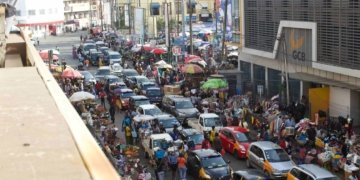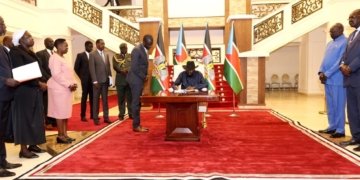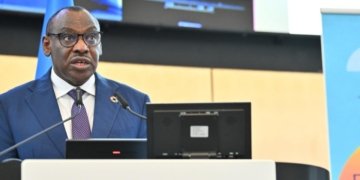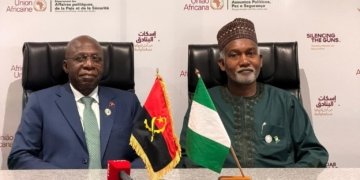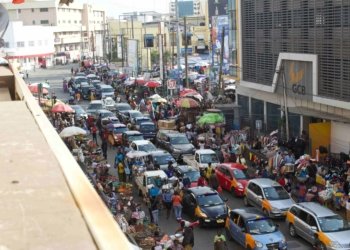YAOUNDE, Cameroon (BG) — In the winter of 1884, leaders from Europe’s most powerful nations gathered in Berlin to determine the fate of a continent none of them belonged to.
Over three months, from Nov. 15, 1884, to Feb. 26, 1885, these Western powers meticulously divided Africa among themselves, establishing the colonial borders that would shape the continent’s future—without a single African representative present.
The conference concluded with the signing of the General Act of Berlin.
The Motives Behind the Conference
The Berlin Conference was orchestrated by German Chancellor Otto von Bismarck, who sought to prevent conflicts among European nations competing for African territory.
By the late 19th century, European imperial powers had intensified their expansionist ambitions, eager to exploit Africa’s vast natural resources, strategic trade routes and labor force.
The conference formalized what was already a frenzied land grab, ensuring that territorial claims were recognized under international law, thus avoiding direct European military conflicts over Africa.
The main participants included Britain, France, Germany, Portugal, Belgium, Spain, Italy and the Netherlands—each driven by economic, political and nationalist interests.
The United States was invited but played no significant role, and, crucially, no African nation or leader was consulted.
The Division of a Continent
The systematic partitioning of Africa followed, with European powers drawing arbitrary borders that paid little regard to existing ethnic, cultural or political structures.
By 1900, nearly 90% of Africa had fallen under European control. The British dominated vast territories, including Egypt, Sudan, South Africa and Nigeria.
France took over Algeria, Tunisia and large portions of West Africa. Belgium, under King Leopold II, claimed the Congo, leading to one of the most brutal colonial regimes in history.
Germany established control over several territories, including German East Africa (now Tanzania, Rwanda and Burundi), German Southwest Africa (now Namibia), Kamerun (now Cameroon) and Togoland (now Togo and part of Ghana).
Although Germany was a latecomer to the scramble for Africa, it quickly became one of the continent’s dominant colonial powers before losing its territories after World War I.
Lasting Consequences
The Berlin Conference set the stage for decades of colonial rule, fundamentally altering Africa’s social, political and economic landscape.
The artificial borders disregarded historical tribal territories, leading to current conflicts.
Exploiting Africa’s natural resources enriched European economies while leaving African nations impoverished.
Colonial rule suppressed indigenous governance, replacing it with foreign administrations that sowed the seeds of authoritarian rule post-independence.
Though the colonial era officially ended in the mid-20th century, the scars of the Berlin Conference remain deeply embedded in Africa’s geopolitical and economic realities.
The arbitrary borders established then continue to fuel territorial disputes and ethnic conflicts, while the economic structures imposed by European powers have had lasting repercussions on Africa’s development.
At a symposium marking the 140th anniversary of the Berlin Conference in January 2024, Togolese diplomat and Minister of Foreign Affairs Prof. Robert Dussey addressed the ongoing consequences of Africa’s partition, stating:
“In Berlin, Africa was both present and absent. It was present as a prize to be divided, with conditions set for its partition, yet absent from the decision-making process. Africa was at the heart of the conference without being a participant.”
He further criticized the enduring impact of colonialism, saying:
“The colonial past is a past that refuses to pass, because Africa still holds a vivid memory of it… Some former colonial powers still view Africa as their sphere of influence, and this is unacceptable for our generation of Africans today.”
A Lesson From History
The Berlin Conference stands as a stark reminder of the consequences of imperialism and the dangers of foreign interference in sovereign territories.
It also serves as a lesson in the importance of self-determination—something Africa was denied in 1884.
As the continent continues to navigate its post-colonial challenges, the legacy of the Berlin Conference remains a defining chapter in the story of Africa.
More than a century later, Africa is still reckoning with the decisions made in Berlin.
The world must recognize this history not as a distant past but as an ever-present reality influencing Africa’s political and economic struggles today.
Africans were once absent from the table where their fate was decided, but today, the real question is not about what was taken—it is about how we reclaim our agency, transform our challenges into opportunities, and shape our own future on our own terms.
